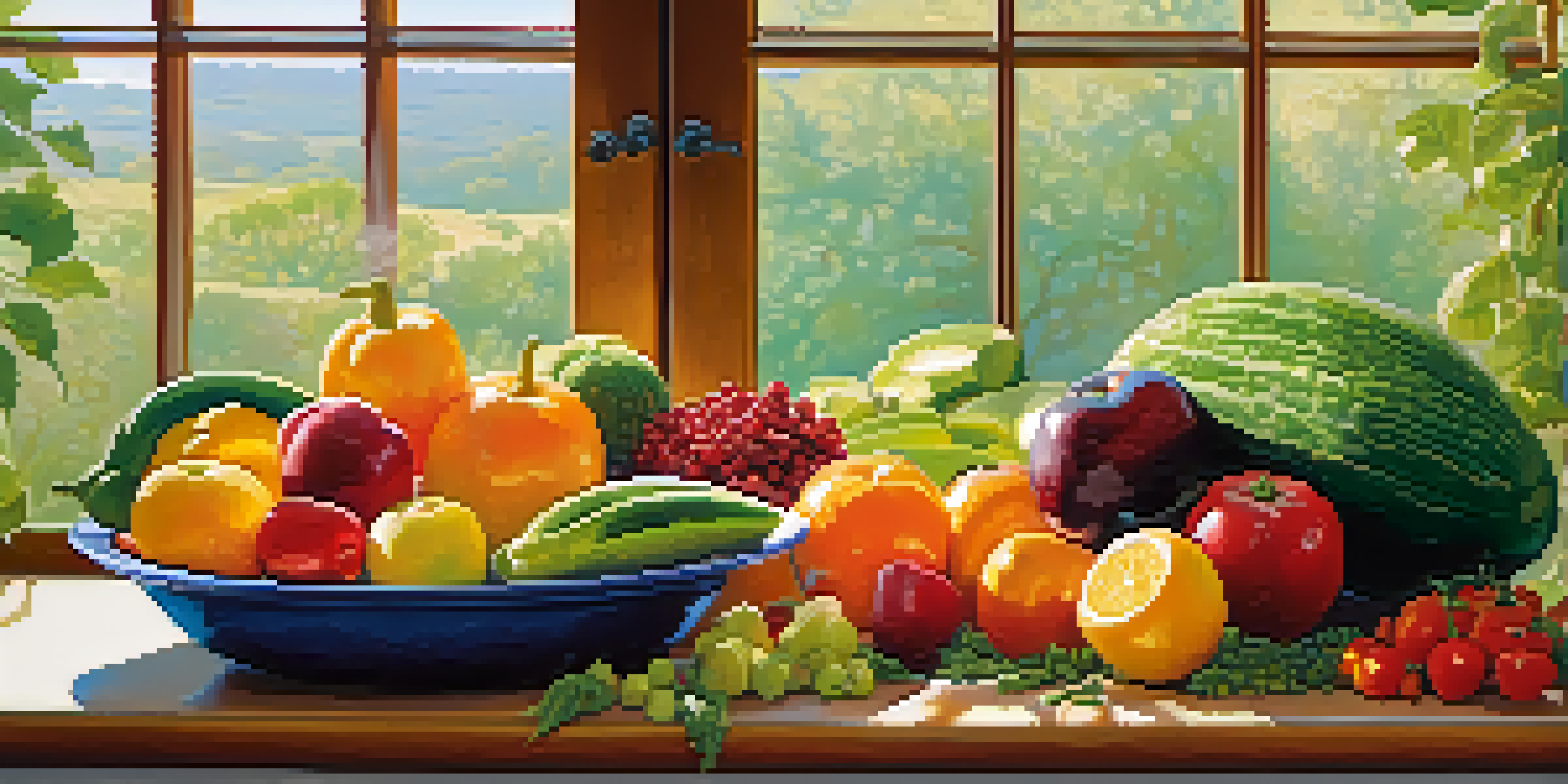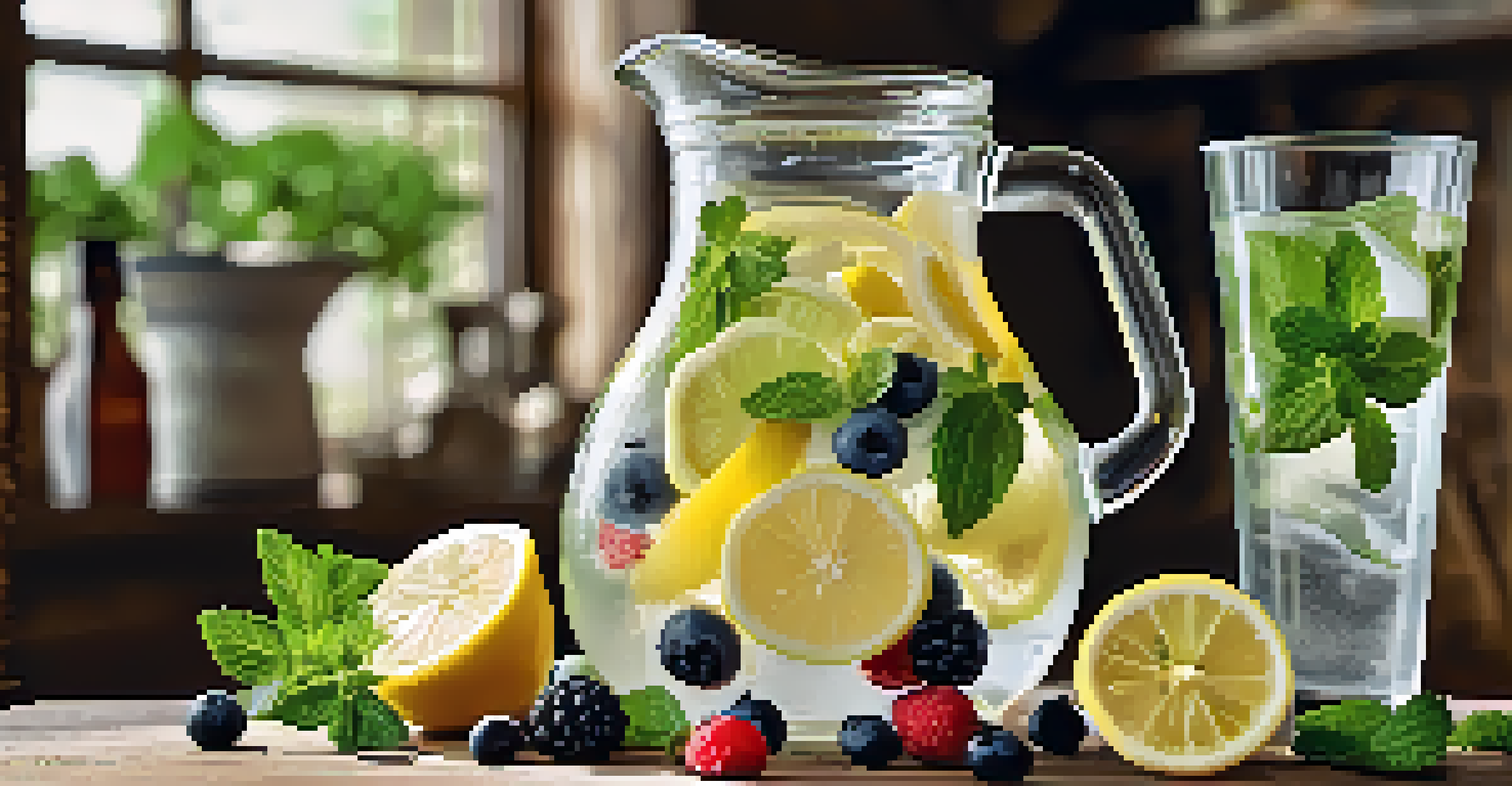Culinary Medicine and the Importance of Hydration

Understanding Culinary Medicine and Its Benefits
Culinary medicine is an emerging field that blends the art of cooking with the science of nutrition. It focuses on using food to prevent and treat chronic diseases, emphasizing the importance of whole, nutrient-dense ingredients. This approach encourages individuals to make healthier food choices while still enjoying the flavors and textures they love.
Let food be thy medicine and medicine be thy food.
Think of culinary medicine as a bridge between your kitchen and your health. By understanding how different foods impact your body, you can make informed decisions that promote wellness. For example, incorporating more fruits and vegetables can help lower your risk of heart disease and improve overall health.
Ultimately, culinary medicine empowers individuals to take control of their health by equipping them with the knowledge and skills needed to prepare nutritious meals. It’s not just about eating to live; it’s about cooking to thrive.
The Crucial Role of Hydration in Wellness
Hydration is often overlooked, yet it plays a critical role in our overall health. Water is essential for nearly every bodily function, including digestion, circulation, and temperature regulation. Without adequate hydration, our bodies can struggle to perform optimally, leading to fatigue, headaches, and even impaired cognitive function.

Consider water as the oil that keeps the engine running smoothly. Just as a car needs oil to function properly, our bodies require water to maintain energy levels and support metabolic processes. Staying hydrated can enhance your mood and boost your productivity throughout the day.
Culinary Medicine Combines Food and Health
Culinary medicine merges cooking with nutrition to empower individuals to use food as a means to prevent and treat chronic diseases.
Moreover, hydration is particularly important when it comes to culinary medicine. Many nutritious foods, such as fruits and vegetables, have high water content. By incorporating these foods into your diet, you not only nourish your body with essential vitamins and minerals, but you also support your hydration needs.
How to Assess Your Hydration Needs
Understanding your hydration needs can be as simple as listening to your body. Thirst is a natural indicator that you may need to drink more fluids, but it’s not the only sign. Other indicators include the color of your urine - pale yellow generally means you’re well-hydrated, while dark yellow suggests you need to drink more water.
Water is the driving force of all nature.
Another way to assess your hydration is by considering your lifestyle. Factors such as physical activity, climate, and diet can all influence how much water you need. For instance, if you’re exercising or spending time in a hot environment, your hydration requirements will increase.
Incorporating a variety of hydrating foods into your meals can also help meet your hydration goals. Foods like cucumbers, oranges, and soups not only provide essential nutrients but also contribute to your overall fluid intake.
Creative Ways to Stay Hydrated Daily
Staying hydrated doesn’t have to be boring! There are plenty of fun and delicious ways to incorporate more fluids into your day. Start by infusing your water with fruits like lemon, berries, or mint to add flavor without extra calories. This simple trick can make drinking water much more enjoyable.
You can also explore herbal teas or flavored sparkling water as alternatives to plain water. These options can provide hydration while offering different tastes and experiences. Additionally, consider setting reminders on your phone to prompt you to take a sip throughout the day.
Hydration is Key to Overall Wellness
Proper hydration supports essential bodily functions and can enhance mood and productivity, making it vital for health.
Remember, hydration can be part of your culinary journey. Try making smoothies or slushies that not only taste great but also boost your fluid intake. Get creative in the kitchen and enjoy the process of staying hydrated!
Common Myths About Hydration Debunked
There are many myths surrounding hydration that can confuse even the most health-conscious individuals. One common myth is that you need to drink eight glasses of water a day, regardless of individual needs. In reality, hydration needs vary from person to person based on factors like activity level and climate.
Another misconception is that all drinks are equally hydrating. While water is the best choice for hydration, drinks like coffee and tea can contribute to your daily intake. However, sugary beverages or those high in caffeine can lead to dehydration, so it's best to enjoy them in moderation.
Lastly, some believe that they only need to focus on hydration during exercise. In truth, maintaining hydration is important throughout the day, not just during workouts. Developing good hydration habits should be a part of your daily routine for overall health.
Hydration Tips for the Whole Family
Keeping the whole family hydrated can be a challenge, but it’s essential for everyone’s health. Start by making hydration a fun family activity. Encourage your kids to decorate their own water bottles or create a hydration chart to track their intake together.
Incorporating hydrating foods into family meals can also help. Make it a goal to include at least one hydrating fruit or vegetable in every meal. For instance, adding watermelon to a summer salad can make it both nutritious and refreshing.
Hydration Needs Vary by Lifestyle
Understanding personal hydration needs involves considering factors like activity level, climate, and dietary choices.
Lastly, lead by example. When children see their parents prioritizing hydration, they’re more likely to adopt those habits themselves. Make it a family tradition to enjoy a refreshing drink together after school or during family meals.
The Future of Culinary Medicine and Hydration
As the fields of culinary medicine and nutrition continue to evolve, the importance of hydration will remain at the forefront. More healthcare professionals are recognizing the need to address hydration in comprehensive health plans, blending culinary skills with nutritional education. This shift aims to empower individuals to make informed and healthy choices.
Innovative research is also exploring the impact of hydration on chronic diseases and overall wellness. As we learn more about how hydration affects our bodies, we can better tailor our dietary recommendations to promote optimal health. This knowledge is vital in creating personalized nutrition plans that consider each individual’s unique needs.

In the coming years, we can expect to see more resources, workshops, and programs that focus on culinary medicine and hydration. The goal will be to equip people with the tools they need to live healthier lives, all while enjoying the process of cooking and eating.